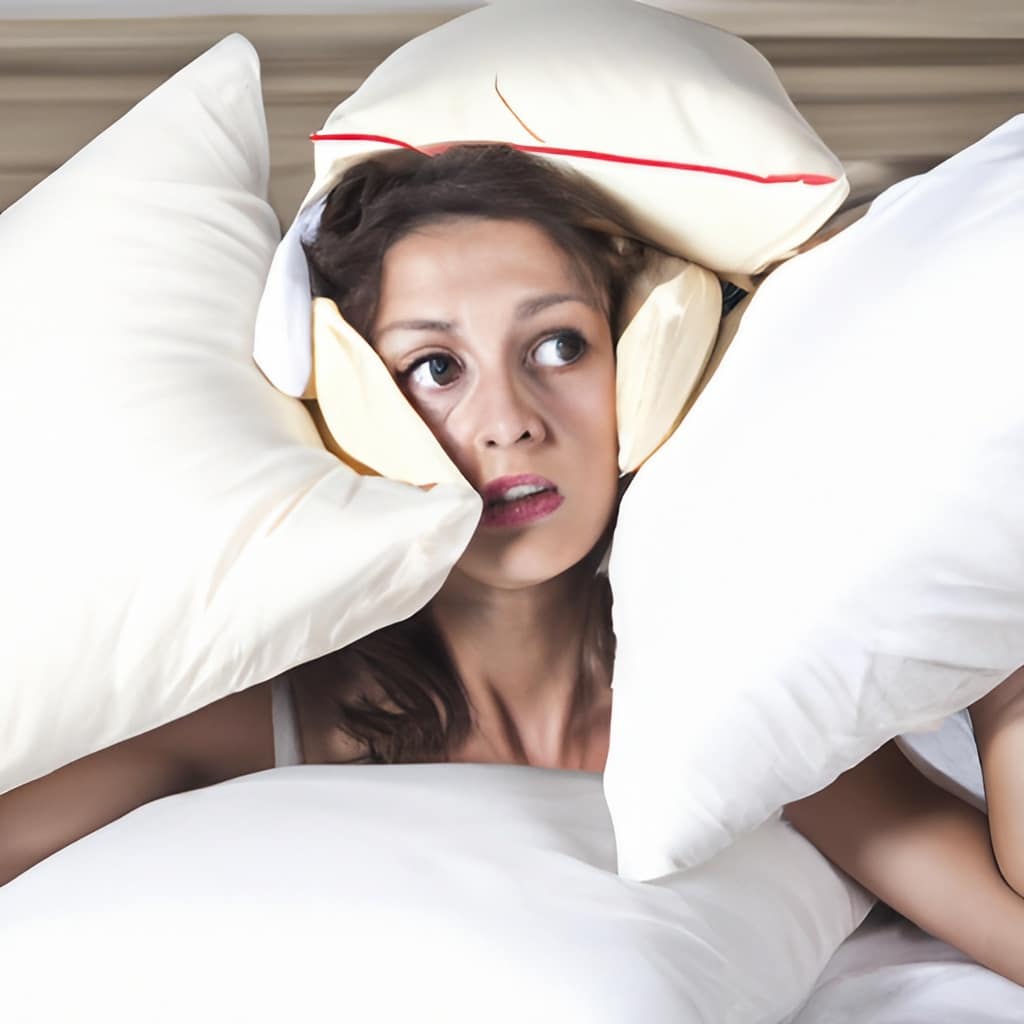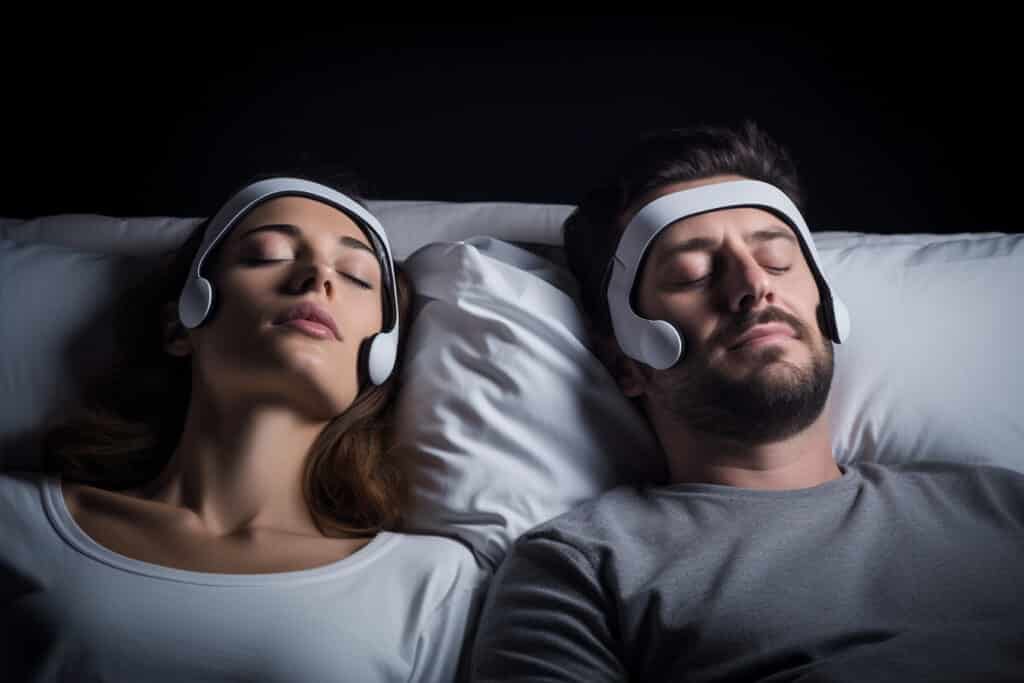How To Deal with Snoring Partner
We've all been there – lying in bed, desperate for a good night's sleep, but instead being serenaded by the symphony of our partner's snoring. So, how to deal with snoring partner?

But what if I told you that there are ways to help your partner reduce their snoring so both of you can get the rest you deserve?
As a snorer myself (my wife has recorded me, & actually compared mine against Frankie our Frenchie…) it is my mission not only to educate individuals on healthy sleep habits but also to provide practical solutions to common issues like this one.
In this article, we'll explore various techniques and strategies that will enable you to assist your loved one in managing their snoring problem.
By taking an empathetic approach and working together as a team, not only will you be supporting your partner's well-being, but you'll also be fostering a deeper connection built on understanding and care.
So let us embark on this journey towards better sleep and improved health for both parties involved.
Table of Contents
The Impact of Snoring on Relationships and Sleep Quality
The impact of having a snoring partner on both relationships and sleep quality cannot be underestimated. As a snorer, I often see couples struggling with the effects of one partner's snoring, leading to sleep deprivation for both individuals involved. This can result in irritability, lack of concentration, and decreased overall well-being – all factors that can negatively affect the dynamics within a relationship.

It is important to remember that addressing your partner's snoring not only serves their health but also has the potential to improve your own sleep quality and strengthen your bond as a couple.
There are several approaches you may consider trying before resorting to separate bedrooms, which should always remain an option if nothing else works effectively. Some practical solutions include using white noise machines or earplugs to help block out the sound of your partner's snores, while others involve encouraging lifestyle changes such as weight loss and improved sleeping positions.
Remember that helping your partner overcome their snoring issues will not only provide them with better sleep but also benefit you by improving your own restful nights. With this understanding in mind, let us now explore some medical conditions associated with snoring and how they might be addressed effectively.
Medical Conditions Associated with Snoring
Having explored the impact of snoring on relationships and sleep quality, it's crucial to recognize that a snoring partner might be suffering from an underlying medical condition. Snoring can be more than just a nuisance; it could indicate the presence of health risks such as obstructive sleep apnea (OSA), high blood pressure, or even heart disease.

The most common disorder associated with snoring is OSA. This occurs when throat muscles relax during sleep and partially or completely block the airway, leading to disrupted breathing patterns throughout the night. Left untreated, OSA can increase the risk of high blood pressure, stroke, heart disease, and other serious health conditions.
Other sleep disorders may also cause loud snoring in bed partners. Encouraging your loved one to consult a healthcare professional for proper diagnosis and treatment options can significantly improve both parties' sleep experience while addressing any potential health concerns.
With this understanding in mind, let us explore some simple lifestyle changes that can help reduce snoring symptoms without resorting to drastic measures like separate bedrooms or earplugs at night-time.
Simple Lifestyle Changes to Reduce Snoring
Simple lifestyle changes can work wonders in reducing your nocturnal orchestra conductor's volume and frequency.
* Shedding those extra pounds: Weight gain, especially around the neck area, increases pressure on airways leading to increased snoring.
* Rethinking happy hour: Limiting alcohol consumption before bedtime can help decrease muscle relaxation in the throat which contributes to snoring.
* Breathe freely: Address nasal congestion issues with saline rinses or decongestants; clear nasal passages promote better airflow while sleeping.
* Becoming side sleepers: Encourage your partner to switch from back to side sleeping positions; this helps prevent the tongue and soft palate from collapsing into the back of the throat.
Incorporating these simple adjustments into daily routines may significantly improve both partners' sleep quality without resorting to more invasive treatment options.
I have seen countless couples benefit from making such modifications for their mutual well-being. And now, let us delve deeper into natural remedies for snoring relief… …by exploring various lifestyle changes, sleep positions, and home remedies that can help reduce snoring and promote better sleep for both partners.
Natural Remedies for Snoring Relief
As we've discussed, making simple lifestyle changes can go a long way in reducing snoring. However, if you or your partner continue to struggle with snoring despite adopting these healthier habits, there are natural remedies for snoring relief that may be worth considering.

After all, finding the right snoring solution is essential not only for achieving restful sleep but also for maintaining overall well-being and strong relationships.
One popular approach involves opening up nasal passages using saline rinses or decongestants before bedtime to alleviate any congestion-causing obstructions.
Another technique targets the soft palate: singing exercises have been shown to help strengthen this area and reduce its vibration during sleep.
For individuals who primarily snore while sleeping on their back – known as supine position – placing a tennis ball inside a pocket sewn onto the back of one's pyjamas can discourage rolling onto the back throughout the night.
These natural remedies can complement other lifestyle changes already made and provide additional support in addressing persistent snoring issues. With more peaceful nights ahead, both partners will benefit from increased energy levels and an enhanced ability to serve others through daily activities.
As we explore further options for managing snoring symptoms, let's delve into the role of sleep positions in snoring reduction as another potentially effective measure.
The Role of Sleep Positions in Snoring Reduction
Understanding the role of sleep positions in snoring reduction is vital for anyone who wants to help alleviate their partner's snoring problem. Generally, people tend to snore more when they sleep on their back, as this position allows the tongue and soft palate to collapse at the back of the throat.
This obstruction can cause vibrations in the throat muscles while breathing during sleep, which results in the sound we recognize as snoring.
The American Sleep Apnea Association recommends side sleeping as an effective way to reduce or eliminate snoring. To encourage your partner to adopt a side-sleeping position, you may consider using a full-length body pillow that provides support and comfort throughout the night.
Alternatively, sewing a tennis ball into the back of your partner's pyjama top can discourage them from rolling onto their back while asleep.
Keep in mind that changing one's sleep habits takes time; be patient with your loved one as they adjust to new positions for improved rest and reduced snoring. As you continue supporting each other through these changes, exploring anti-snoring devices and their effectiveness could be another step worth considering together on your journey toward peaceful slumber.
Anti-Snoring Devices and Their Effectiveness
As we've explored the impact of sleep positions on snoring, it's crucial to consider other solutions that can significantly reduce or eliminate this disruptive habit. Anti-snoring devices are an increasingly popular choice for many individuals looking for a more peaceful night's rest.

These devices vary in their design and function, but they all aim to improve airflow during sleep and diminish the snoring noise associated with restricted airways. Among these options are continuous positive airway pressure (CPAP) machines, nasal strips, and oral appliances – each offering unique benefits tailored to individual needs.
Evaluating the effectiveness of anti-snoring devices is essential when considering which option may best suit you or your partner. Continuous positive airway pressure (CPAP) therapy is often prescribed as a first-line treatment for sleep apnea and severe snorers due to its proven efficacy in keeping the upper airway open throughout the night.
Nasal strips offer a non-invasive approach by physically opening up the nostrils to promote better breathing; however, they may be less effective if snoring originates from deeper within the throat region.
Oral appliances work by repositioning the jaw forward, which helps maintain an open airway and reduces vibrations responsible for producing snoring noise. The selection of an appropriate device largely depends on factors such as severity of snoring, sleep position preferences, comfort levels, and any underlying medical issues that could contribute to disrupted breathing patterns during sleep.
Tips For Coping with A Snoring Partner
Dealing with a snoring partner can often feel like trying to sleep next to a roaring freight train but fear not – there are ways to navigate this night time nuisance.
A good night's sleep is essential for both you and your partner, so it's important to address the issue head-on while keeping in mind that their snoring may be a sign of an underlying medical condition or sleep apnea.

Solutions such as investing in ear plugs or opting for separate rooms during bedtime might seem drastic, but they could provide temporary relief from your partner's snoring and improve the quality of your zzzs.
However, addressing the root cause should always remain a priority.
Encourage your sleeping partner to consult with a sleep specialist who can help identify potential causes and recommend appropriate treatments such as oral appliance therapy or lifestyle changes.
In some cases, adjusting one's sleeping position using an adjustable bed frame or comfortable mattress can significantly reduce snoring episodes.
Remember: tackling the problem together as a team will not only strengthen your relationship but also ensure that both parties get the rest they deserve, without having to resort to banishing each other to separate quarters every night.
Thoughts
Snoring can create a significant obstacle in any relationship, often leading to sleepless nights and frustration for both partners. As a snorer myself,, I have seen first-hand the toll this seemingly harmless habit takes on couples' emotional well-being and overall health. It is crucial to address snoring not just as an annoyance but also as a potential indicator of underlying medical conditions.
Fortunately, there are numerous ways you and your partner can work together to alleviate snoring. Simple lifestyle changes like weight loss or avoiding alcohol before bedtime may provide relief; likewise, natural remedies such as nasal strips or humidifiers might help keep those night time noise levels down. Don't forget about exploring different sleep positions—sometimes all it takes is adjusting how we lay our heads at night to make a world of difference!
Ultimately, patience, support, and open communication will be key in coping with your partner's snoring. By working together to find effective solutions that suit your unique needs, you'll improve not only the quality of your sleep but also the strength of your bond as a couple.
Snoring needn't spell doom for even the closest relationships when approached with understanding and genuine desire for improvement. So go ahead: tackle those nocturnal noises head-on and rediscover the joys of restful slumber!
FAQs
How can a white noise machine help me deal with my partner's snoring?
Using a white noise machine is an effective way to learn how to deal with snoring partner. By producing a consistent, soothing sound, the machine can mask your partner's snoring, helping you achieve a good night's sleep. This way, you can cope with a snoring partner without resorting to separate rooms or enduring hours of poor sleep.
Is sleeping in different rooms the only way to ensure a good night's sleep when my partner snores?
Sleeping in separate rooms is not the only method for learning how to deal with snoring partnerhttps://www.nhs.uk/conditions/sleep-apnoea/. First, try discussing the problem with your bed partner and explore possible lifestyle changes, such as adjusting sleep positions or using a device to support the lower jaw. Finding the right solution can help both you and your partner get enough sleep without resorting to different rooms, ultimately teaching you how to deal with a snoring partner.
My husband snores loudly in the middle of the night, and I'm not getting enough sleep. What's the first thing I should do to address this issue?
The first thing you should do when learning how to deal with snoring partner is to communicate openly about the problem. Discuss the snoring sound and its impact on your sleep, and work together to find possible solutions. This may involve trying natural remedies, making lifestyle adjustments, or seeking professional help if the snoring persists. By being proactive and addressing the issue together, you will be better equipped to deal with your husband's snoring and improve your quality of sleep.
How can a lack of sleep due to my partner's snoring affect my health and relationship?
Learning how to deal with snoring partner is crucial because a lack of sleep can lead to both physical and emotional issues. Poor sleep can result in fatigue, irritability, and decreased focus, which can strain your relationship. Moreover, long-term sleep deprivation can contribute to health problems, such as cardiovascular diseases and weakened immunity. Understanding how to deal with a snoring partner is essential for maintaining a healthy relationship and ensuring that both you and your partner get the rest you need for your overall well-being.
from Life & Healthy Living https://lifeandhealthyliving.com/how-to-deal-with-snoring-partners-easy/
via IFTTT
No comments:
Post a Comment